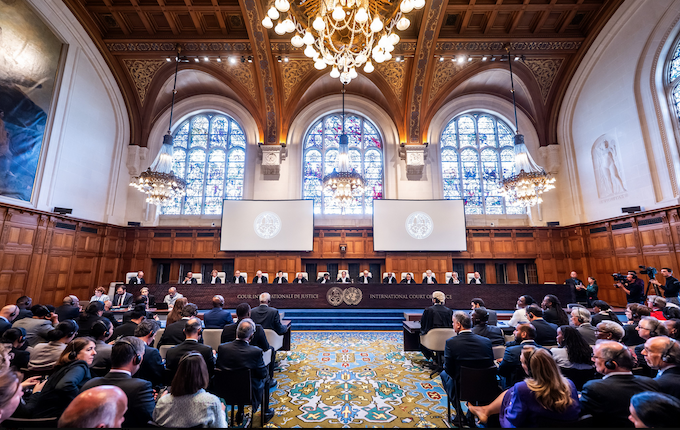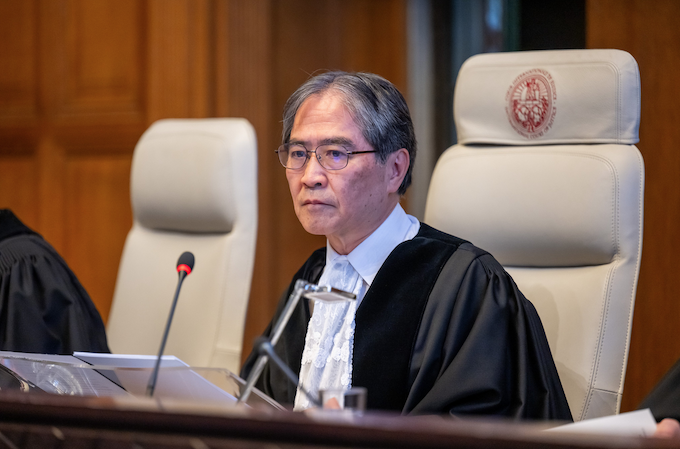
By Jamie Tahana in The Hague for RNZ Pacific
The United Nations’ highest court has found that countries can be held legally responsible for their greenhouse gas emissions, in a ruling highly anticipated by Pacific countries long frustrated with the pace of global action to address climate change.
In a landmark opinion delivered yesterday in The Hague, the president of the International Court of Justice, Judge Yuji Iwasawa, said climate change was an “urgent and existential threat” that was “unequivocally” caused by human activity with consequences and effects that crossed borders.
The court’s opinion was the culmination of six years of advocacy and diplomatic manoeuvring which started with a group of Pacific university students in 2019.
- READ MORE: ICJ climate crisis ruling: Will world’s top court back Pacific-led call to hold governments accountable?
- Do countries have a duty to prevent climate harm? The world’s highest court is about to answer this crucial question
- Other climate crisis reports
They were frustrated at what they saw was a lack of action to address the climate crisis, and saw current mechanisms to address it as woefully inadequate.
Their idea was backed by the government of Vanuatu, which convinced the UN General Assembly to seek the court’s advisory opinion on what countries’ obligations are under international law.
The court’s 15 judges were asked to provide an opinion on two questions: What are countries obliged to do under existing international law to protect the climate and environment, and, second, what are the legal consequences for governments when their acts — or lack of action — have significantly harmed the climate and environment?

Overnight, reading a summary that took nearly two hours to deliver, Iwasawa said states had clear obligations under international law, and that countries — and, by extension, individuals and companies within those countries — were required to curb emissions.
Iwasawa said the environment and human rights obligations set out in international law did indeed apply to climate change.
‘Precondition for human rights’
“The protection of the environment is a precondition for the enjoyment of human rights,” he said, adding that sea-level rise, desertification, drought and natural disasters “may significantly impair certain human rights, including the right to life”.
To reach its conclusion, judges waded through tens of thousands of pages of written submissions and heard two weeks of oral arguments in what the court said was the ICJ’s largest-ever case, with more than 100 countries and international organisations providing testimony.
They also examined the entire corpus of international law — including human rights conventions, the law of the sea, the Paris climate agreement and many others — to determine whether countries have a human rights obligation to address climate change.

Major powers and emitters, like the United States and China, had argued in their testimonies that existing UN agreements, such as the Paris climate accord, were sufficient to address climate change.
But the court found that states’ obligations extended beyond climate treaties, instead to many other areas of international law, such as human rights law, environmental law, and laws around restricting cross-border harm.
Significantly for many Pacific countries, the court also provided an opinion on what would happen if sea levels rose to such a level that some states were lost altogether.
“Once a state is established, the disappearance of one of its constituent elements would not necessarily entail the loss of its statehood.”
READ HERE: The summary of the #ICJ Advisory Opinion on the Obligations of States in respect of Climate Change. https://t.co/7TWc7ifwfX pic.twitter.com/vVxxwpZpbX
— CIJ_ICJ (@CIJ_ICJ) July 23, 2025
Significant legal weight
The ICJ’s opinion is legally non-binding. But even so, advocates say it carries significant legal and political weight that cannot be ignored, potentially opening the floodgates for climate litigation and claims for compensation or reparations for climate-related loss and damage.
Individuals and groups could bring lawsuits against their own countries for failing to comply with the court’s opinion, and states could also return to the International Court of Justice to hold each other to account.
The opinion would also be a powerful precedent for legislators and judges to call on as they tackle questions related to the climate crisis, and give small countries greater weight in negotiations over future COP agreements and other climate mechanisms.
Outside the court, several dozen climate activists, from both the Netherlands and abroad, had gathered on a square as cyclists and trams rumbled by on the summer afternoon. Among them was Siaosi Vaikune, a Tongan who was among those original students to hatch the idea for the challenge.
“Everyone has been waiting for this moment,” he said. “It’s been six years of campaigning.
“Frontline communities have demanded justice again and again,” Vaikune said. “And this is another step towards that justice.”

‘It gives hope’
Vanuatu’s Climate Minister Ralph Regenvanu said the ruling was better than he expected and he was emotional about the result.
“The most pleasing aspect is [the ruling] was so strong in the current context where climate action and policy seems to be going backwards,” Regenvanu told RNZ Pacific.
“It gives such hope to the youth, because they were the ones who pushed this.
“I think it will regenerate an entire new generation of youth activists to push their governments for a better future for themselves.”
Regenvanu said the result showed the power of multilateralism.
“There was a point in time where everyone could compromise to agree to have this case heard here, and then here again, we see the court with the judges from all different countries of the world all unanimously agreeing on such a strong opinion, it gives you hope for multilateralism.”
He said the Pacific now has more leverage in climate negotiations.
“Communities on the ground, who are suffering from sea level rise, losing territory and so on, they know what they want, and we have to provide that,” Regenvanu said.
“Now we know that we can rely on international cooperation because of the obligations that have been declared here to assist them.”
The director of climate change at the Pacific Community (SPC), Coral Pasisi, also said the decision was a strong outcome for Pacific Island nations.
“The acknowledgement that the science is very clear, there is a direct clause between greenhouse gas emissions, global warming and the harm that is causing, particularly the most vulnerable countries.”
She said the health of the environment is closely linked to the health of people, which was acknowledged by the court.
This article is republished under a community partnership agreement with RNZ.














































